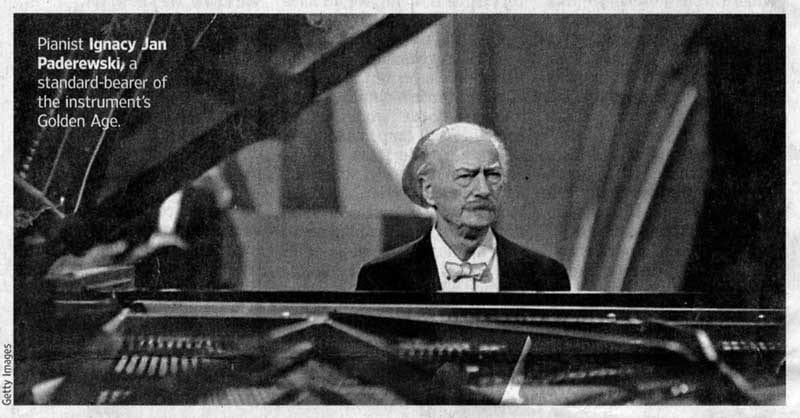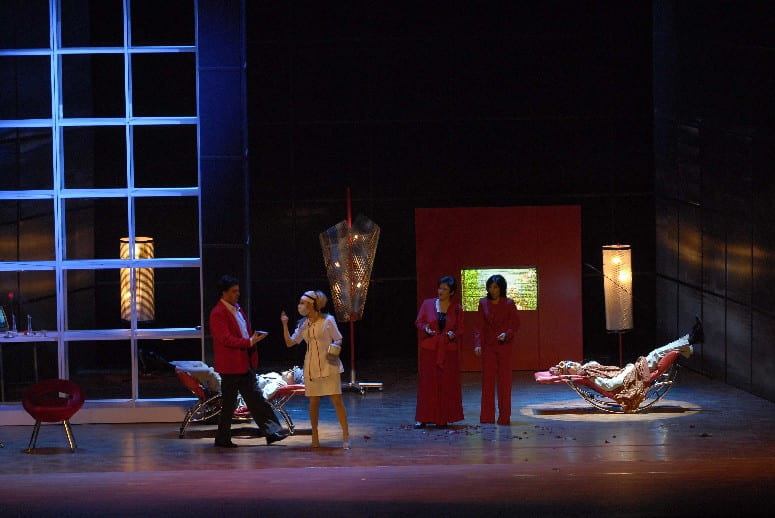Polish Music Center Newsletter Vol. 14, no. 2
PMC News
Paderewski Wrap-Up
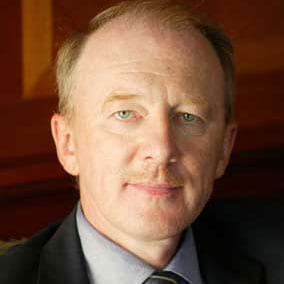 With the passing of 2007, we have closed the books on the Paderewski Monument Fund Drive. Having the facts and figures finally at hand, we would like to publish them along with our heartfelt appreciation to the numerous individuals and institutions who contributed to the success of this project.
With the passing of 2007, we have closed the books on the Paderewski Monument Fund Drive. Having the facts and figures finally at hand, we would like to publish them along with our heartfelt appreciation to the numerous individuals and institutions who contributed to the success of this project.
It is our wish to thank as many people individually as possible. In the listing that follows, we cite the names of contributors as they appear in our Fund Drive records. We hope we did not inadvertently exclude anyone from this list.
Our gratitude extends first and foremost to the leaders of Polish community in Southern California and the representatives of Polish government in the United States. Consul General Krystyna Tokarska-Biernacik helped to organize the Steering Committee in its early days. Consul Paulina Kapuścińska—first in her role as the Consul for Culture, then as Consul General—contributed immensely in terms of funding, liaison with the Office of Poland’s First Lady and the Ministry of Culture and National Heritage, logistics, and event reception. Consul Kapuścińska also generously gave a lot of her precious time for day-to-day advice and support of this project. Ambassador Janusz Reiter’s gracious presence at the unveiling and his strong support of the Paderewski monument at USC were, likewise, of great help to us.
Rich Widerynski and Marty Cepielik from the Polish American Congress have provided enormous enthusiasm and energy in promoting the Paderewski Fund Drive at all kinds of Polish events and gatherings in Southern California. John Garstka, treasurer of Polish American Historical Association kept the books and tracked the fundraising efforts through a special account he set up at the POLAM Credit Union. Jamee Harasick (also from PAHA) and Elizabeth Rudzinski (from Polish National Alliance) were also helpful with their work on the Steering Committee. We are also in much debt to the Modjeska Club of Los Angeles and its president, Dorota Olszewska. The Club organized a very successful fundraising concert in the hospitable home of Stanley and Helena Kołodziey, whose charitable support of all Polish causes—including this one—is nothing short of exemplary.
We also appreciate the strong leadership of the Kosciuszko Foundation and its president, Joseph E. Gore, and the Taube Foundation for Jewish Life and Culture—with Ted Taube, Shana Penn and Brian Campbell—whose substantial financial support was instrumental in meeting the Fund Drive goals.
And now, more details, beginning with the cost side. The expenses for the Paderewski Monument and installation added up to the sum of $48,782.16. These costs included the artist’s fee, monument casting and shipping, and plaque casting and installation, as well as architectural drawings for the monument base and surrounding area, site preparation, grass and sprinkler installation, and tree planting and landscaping for the site at USC.
The Unveiling Ceremony and Paderewski Lecture-Recital expenses added up to the sum of $9,991.76. This amount included printing and mailing of announcements and invitations, publishing the “Paderewski Celebration” program booklet, USC Office of Protocol fees, purchase of music scores, rental of outdoor sound systems & communication equipment, rental of lectern & chairs for the unveiling, security for the site, VIP reception with the Dean of Music, Newman Concert Hall rental fees, performers’ honoraria, and flowers.
Total expenses for the Paderewski Fund Drive: $58,773.92
 The generous individual donations to the Paderewski Fund Drive added up to $11,047.00, and included contributions from the following persons: Wieslaw & Zofia Adamowicz; Bernice Barc; Gale Barstow; Zygmunt Andy Bartkowski; Christine Barton; Helena Bernat; Katherine Bielski; Brad & Audrey Bigelow; Lucy Borik; Slawomir Brzezinski & Malgorzata Brzezinska; Walter & Harriet Brzozowski; Joseph & Mila Cangelosi; Martin & Elizabeth Cepielik; Bartosz Chmielowski; Robert & Anita Chrisman; Michael Chudzinski; Michael & Alicia Ciecek; Roman Czarny; Andrzej & Nina Dabrowa; Gary Denk; Andrew & Lidia Dowen; Misha Ursula Farmas; Edyta Frackiewicz-Koziol; John & Pauline Garstka; H.E. Gaskey; Izabela Gawronska; Marcella Gleason; Eugene Grabinski & Joanna Halvorsen; Piotr & Iwona Grzegorczyk; Camilia Guendel; Hanka Gutkowska; Wanda Gwozdziowski; Dottie Harasick; Martin & Henrietta Henzel; Joseph A. Herter; Krystyna Howard; Witold & Maria Hryniewicki; Andrew & Jadwiga Inglis; Thaddeus Irzyk; Gregory Jablonowski; Andrew & Halina Jagoda; Sophie & Mark Janczur; Henry & Krystyna Jankowski; Dennis Jones; Tomasz & Anna Kachelski; Anna M. Kane; Eugene Kapaloski; Theodora Karczewski; Martin & Susan Karpiel; Martin & Kinga Kazinski; Gene Kellner; A.P. & M.S. Kerza-Kwiatecki; Wojciech Kocyan; Stanley Kolodziey Family; Anna & James Kosinski; Frank & Janina Kosowicz; Edward & Maria Koterba; Andrzej & Barbara Kozlowski; Boguslaw & Krystyna Kuszta; Romuald Kujawski & Beata Musielak; Elizabeth Adney & Jean Leonard; Maria Lobodzinski, D.D.S.; J.M. Malek; Andrew & Joanna Maleski; Laura Matthews; Bogdan & Magdalena Matysek; Iwona Miziolek; Lliana Moradi; Carl & Eva Muchnik; Bozena Najfeld & Hanna Oprawski; Theresa Narbut; Jadwiga Narebski & Mary Ann Lisowski; Andrew Nizynski; Elzbieta Nowicki; Zbigniew & Ewa Kumor Nyczak; Anna & Martin Olekszyk; Christopher & Bozena Onzol; John Olszewski; Witold Olszewski; Mayur & Jasmine Patel; Aniela Pawick; Irena Pawlowski; Zbigniew & Zofia Petrovich; Zbyslaw Petryka; Boguslaw L. Plewnia; Teodor & Maria Polak; Antony Barry & Arlene Enid Polonsky; Irene Price; Zbigniew & Lucyna Przasnyski; Helen Przygoda; Janet Rolek; Edward Rowny; Chester Ruth; Thomas J. Seifrid; Henry Silka; Paul & Alicia Silka; Amanda Stork; Stanley & Irene Sulkowski; Wally & Bozena Szeremeta; Stefan Sznajder; Robert, Eva & Ivone Sznuk; Elizabeth Szupinska; Thomas & Mary Jo Tartaglia; Paul & Yolanta Tensor; Maja Trochimczyk; Thomas Van Damm; Elizabeth Vars; George & Lena Wagner; Grazyna Wiacek; Lesley Widerynski & Deborah Gmeiner; Richard Widerynski; Jania & Marian Wiercioch; Alexander & Jolanta Wilk; Anna Winitsky; Dan Wisner; Irene Witkowski; Eleanor Wojniusz; Stefan Wolowicz; J. & U. Zagner; Roman & Danuta Zawadzki; Wieslaw & Donna Zuchowski; and Frank & Wanda Zurawski.
The generous individual donations to the Paderewski Fund Drive added up to $11,047.00, and included contributions from the following persons: Wieslaw & Zofia Adamowicz; Bernice Barc; Gale Barstow; Zygmunt Andy Bartkowski; Christine Barton; Helena Bernat; Katherine Bielski; Brad & Audrey Bigelow; Lucy Borik; Slawomir Brzezinski & Malgorzata Brzezinska; Walter & Harriet Brzozowski; Joseph & Mila Cangelosi; Martin & Elizabeth Cepielik; Bartosz Chmielowski; Robert & Anita Chrisman; Michael Chudzinski; Michael & Alicia Ciecek; Roman Czarny; Andrzej & Nina Dabrowa; Gary Denk; Andrew & Lidia Dowen; Misha Ursula Farmas; Edyta Frackiewicz-Koziol; John & Pauline Garstka; H.E. Gaskey; Izabela Gawronska; Marcella Gleason; Eugene Grabinski & Joanna Halvorsen; Piotr & Iwona Grzegorczyk; Camilia Guendel; Hanka Gutkowska; Wanda Gwozdziowski; Dottie Harasick; Martin & Henrietta Henzel; Joseph A. Herter; Krystyna Howard; Witold & Maria Hryniewicki; Andrew & Jadwiga Inglis; Thaddeus Irzyk; Gregory Jablonowski; Andrew & Halina Jagoda; Sophie & Mark Janczur; Henry & Krystyna Jankowski; Dennis Jones; Tomasz & Anna Kachelski; Anna M. Kane; Eugene Kapaloski; Theodora Karczewski; Martin & Susan Karpiel; Martin & Kinga Kazinski; Gene Kellner; A.P. & M.S. Kerza-Kwiatecki; Wojciech Kocyan; Stanley Kolodziey Family; Anna & James Kosinski; Frank & Janina Kosowicz; Edward & Maria Koterba; Andrzej & Barbara Kozlowski; Boguslaw & Krystyna Kuszta; Romuald Kujawski & Beata Musielak; Elizabeth Adney & Jean Leonard; Maria Lobodzinski, D.D.S.; J.M. Malek; Andrew & Joanna Maleski; Laura Matthews; Bogdan & Magdalena Matysek; Iwona Miziolek; Lliana Moradi; Carl & Eva Muchnik; Bozena Najfeld & Hanna Oprawski; Theresa Narbut; Jadwiga Narebski & Mary Ann Lisowski; Andrew Nizynski; Elzbieta Nowicki; Zbigniew & Ewa Kumor Nyczak; Anna & Martin Olekszyk; Christopher & Bozena Onzol; John Olszewski; Witold Olszewski; Mayur & Jasmine Patel; Aniela Pawick; Irena Pawlowski; Zbigniew & Zofia Petrovich; Zbyslaw Petryka; Boguslaw L. Plewnia; Teodor & Maria Polak; Antony Barry & Arlene Enid Polonsky; Irene Price; Zbigniew & Lucyna Przasnyski; Helen Przygoda; Janet Rolek; Edward Rowny; Chester Ruth; Thomas J. Seifrid; Henry Silka; Paul & Alicia Silka; Amanda Stork; Stanley & Irene Sulkowski; Wally & Bozena Szeremeta; Stefan Sznajder; Robert, Eva & Ivone Sznuk; Elizabeth Szupinska; Thomas & Mary Jo Tartaglia; Paul & Yolanta Tensor; Maja Trochimczyk; Thomas Van Damm; Elizabeth Vars; George & Lena Wagner; Grazyna Wiacek; Lesley Widerynski & Deborah Gmeiner; Richard Widerynski; Jania & Marian Wiercioch; Alexander & Jolanta Wilk; Anna Winitsky; Dan Wisner; Irene Witkowski; Eleanor Wojniusz; Stefan Wolowicz; J. & U. Zagner; Roman & Danuta Zawadzki; Wieslaw & Donna Zuchowski; and Frank & Wanda Zurawski.

Total donations for the Paderewski Fund Drive: $51,868.98
Once again, on behalf of the entire staff of the Polish Music Center at USC, we want to thank all of our contributors for splendidly rising to the challenge. Now that Paderewski has returned to the USC campus, please come to visit our Center and the monument, the first such tribute to a Polish citizen in California. These names will appear in the program booklet of our March 27, 2008 concert of Polish music at 7:30pm in Newman Hall, to which you are cordially invited. If you have any questions, please contact the PMC at (213) 821-1356 or polmusic@thornton.usc.edu.
[MZ]
News
Musica Polonica Nova
The 26th edition of the Polish Contemporary Music Festival – Musica Polonica Nova will take place in Wrocław between February 15 and 22, 2008. It will be full of outstanding musical events, including a staging of an opera by Joann Bruzdowicz, a musical drama by Tadeusz Baird and a ballet by Rafał Augustyn, all presented by the Wrocław Opera. There also will be three symphonic concerts and numerous chamber concerts. The artists and ensembles include Jerzy Maksymiuk, Jacek Kaspszyk, Michał Dworzyński, Silesian Quartet, Lutosławski Quartet, Leopoldinum Chamber Orchestra, Lutosławski Piano Duo, Beethoven Academy Orchestra and Polish Radio National Symphony Orchestra, among others.
The following pieces will have their world premiere at this year’s festival (in chronological order):

Tadeusz Baird – Jutro
Joanna Bruzdowicz (at left) – Kolonia karna
Krystian Kiełb – Aeras – aforistic sketches for violin solo
Paweł Hendrich – Metasolidus for orchestra
Michał Moc – Stuntmans for orchestra
Tomasz Praszczałek – Concerto for viola and orchestra
Maciej Jabłoński – Déjaà vu for cello and orchestra
Robert Kurdybacha – Ainulindalë (to Silmarillion by J.R.R. Tolkien)
Ryszard Mieczysław Klisowski – Gloria for mixed choir
Zbigniew Kozub – Pieszczota for mixed choir to words by Bolesław Leśmian: Pieszczota
Bartłomiej Krcha – Pierwszy śnieg for mixed choir to words by Marzena Broda: Pierwszy śnieg
Marcin Bortnowski – Interrogavi terram for voices and cello
Leszek Wisłocki – XII String Quartet John Paul II in memoriam
Barbara Kaszuba – II String Quartet
Michał Prynda – I String Quartet
Marcin Markowicz – I String Quartet
Jan Duszyński – II String Quartet
 Piotr Moss (at right) – Elegia IV for strings
Piotr Moss (at right) – Elegia IV for strings
Katarzyna Stępniewska: Dzwony jesienne [Autumn Bells]
Wiesław Cienciała: Dist. Bells (part I)
Piotr Radko: Etiuda dzwonków from 7 Miniatures Cycle
Dobromiła Jaskot: Res
Zbigniew Bargielski: Dolina tęczowych dzwonów [The Valley of Rainbow Bells]
Monika Kędziora – Melodia for two flutes
Sebastian Ładyżyński – just breathe for flute solo
Michał Rosiak – Miniature for flute and piano
Jagoda Szmytka – per.-o for flute and piano
Aleksandra Gryka – Youmec for harpsichord and tape
Zbigniew Bargielski – VI String Quartet
Mateusz Ryczek – NGC 4414 for two pianos and percussion
Ewa Podgórska – Akord zwiększony for two pianos
Adrian Foltyn – Son’tasy 2.1 for two pianos
Wojciech Ziemowit Zych – Różnia (part I) for two pianos and percussion
There also will be several excellent Polish premieres during the festival. The pieces scheduled to have their national debut include: Krystian Kiełb’s – Entropě for double-bass solo; Hanna Kulenty – Breathe for string orchestra; Tadeusz Wielecki’s – Thésis for flute solo; Katarzyna Głowicka’s – Presence for piano, amplified voice and electronics; Sławomir Wojciechowski – Ge-sheng for violin, viola, cello, flute, clarinet and accordion. Composer Hanna Kulenty gives the following program note about her piece, Breathe:
I wrote ‘Breathe’ in 1987, and in that same year I won the first prize with it at the Composers’ Competition, Warsaw Branch of the Polish Composers Union. One part of the prize was some money, and I remember I bought a pair of new shoes and a wintercoat. The second part of the prize was a performance, but somehow this never happened (only a recording was made).
I don’t have the shoes and coat anymore, but now, after 21 years, I think I must be happy that ‘Breathe’ finally will have its Polish premiere.
For a detailed program and more information about the Festival, please visit www.musicapolonicanova.pl/program.html
Ptaszyńska Premiere
 On January 18th in Młynarski Hall of the Polish National Opera, Marta Ptaszyńska’s newest opera for children, Magic Doremik, was premiered. Iwona Sowińska conducted the Orchestra of the Polish National Opera, as well as artists of the Polish National Opera’s Chorus and Alla Polacca Children’s Choir for the premiere. Below is more information about the opera from the National Opera website (www.teatrwielki.pl):
On January 18th in Młynarski Hall of the Polish National Opera, Marta Ptaszyńska’s newest opera for children, Magic Doremik, was premiered. Iwona Sowińska conducted the Orchestra of the Polish National Opera, as well as artists of the Polish National Opera’s Chorus and Alla Polacca Children’s Choir for the premiere. Below is more information about the opera from the National Opera website (www.teatrwielki.pl):
After the success of Marta Ptaszyńska’s Mr. Marimba with libretto by Agnieszka Osiecka, which was performed more than a hundred times, the Polish National Opera commissioned the composer to write another opera for children. This time Ptaszyńska wrote the libretto herself, basing it on Rodari’s popular book for children. It is the story of a boy gifted with a voice so strong that he has to whisper so as not to destroy everything around him. People are scared of him, thinking he is a miracle-worker or a magician. The boy sets off for the wide world, and comes to the strange Country of Liars where cats bark, dogs meow, and the bakery sells ink. The country is ruled by an evil king whose law orders people to lie. Gelsomino’s voice comes in very handy here. He has no qualms about using it to destroy the prison, demolish the self-anointed king’s palace, quash tyranny, and end the lying. Newspapers stop publishing false news, people start calling things by their proper names, dogs learn to bark again, and cats meow. Life finally gets back to normal…

Schaeffer Premiere/Anglo-Polish Season
 The 2008 season of the Alvarez Chamber Orchestra was launched at the Polish Embassy in London on the 16th of January. The event was distinguished by the World Premiere of a new work by Polish composer Bogusław Schaeffer, written for Elżbieta Baklarz with the imaginatively appropriate title Fur Elise. Ms. Baklarz is a harpist with the Alvarez Chamber Orchestra as well as the orchestra’s International Liason Officer; in this role, she is responsible for securing the services of some of the best musicians from the Sinfonietta Cracovia to play with the Alvarez Chamber Orchestra.
The 2008 season of the Alvarez Chamber Orchestra was launched at the Polish Embassy in London on the 16th of January. The event was distinguished by the World Premiere of a new work by Polish composer Bogusław Schaeffer, written for Elżbieta Baklarz with the imaginatively appropriate title Fur Elise. Ms. Baklarz is a harpist with the Alvarez Chamber Orchestra as well as the orchestra’s International Liason Officer; in this role, she is responsible for securing the services of some of the best musicians from the Sinfonietta Cracovia to play with the Alvarez Chamber Orchestra.
Soloists performing at the concert also included Rehanna Browne, who played the cadenza from Diana Burrell’s Flute Concert. Rehanna Browne is a young flautist from the Purcell School and the National Youth Orchestra of Great Britain.
The 2008 season of the Alvarez Chamber Orchestra will concentrate on British and Polish Music, highlighting two important composers who are celebrating significant birthdays: British composer Diana Burrell will be 60 and Polish composer Zygmunt Krauze, 70. The season will culminate on November 15-16, with a program entitled “Northern Ayres: an Anglo-Polish Celebration,” featuring Zygmunt Krauze performing the piano parts of his works in person. The works by Zygmunt Krauze have been chosen by the composer himself in consultation with Geoffrey Álvarez, the ensemble’s conductor.
Moszumańska-Nazar Book
Genes of a Creative Personality from Lwów. Conversations with Krystyna Moszumańska-Nazar by Małgorzata Wożna-Stankiewicz is the title of the book newly released by Musica Iagellonica. The book is a collection of reflections about the musical culture of Lwów before WWII and Kraków after the war. Moszumańska-Nazar talks about her musical views, creative process and compositions. In addition, the book contains transcripts of her reviews and Doctorate Honoris Causa acceptance speech. The book’s table of contents is available here.
Portrait Of Grella-Mozejko
 For almost 10 years, Swiss saxophonist Laurent Estoppey(pictured at right) and Polish-Canadian composer Piotr Grella-Mozejko have collaborated on many compositions. To celebrate this anniversary, Estoppey will present a quarter-century retrospective of Grella-Mozejko’s musical output in Vevey, Switzerland. The performance will feature Laurent Estoppey on saxophones, and an ensemble including: Virginie Falquet, piano; Peter Baumann, percussion; Antonio Albanese, guitar; and Dragos Tara, bass. The concert program will consist of the following pieces: Time is a river without banks – for alto saxophone; Moon down – for saxophone and piano; aagyn – for tenor saxophone (creation); a’roma – for ensemble; Kinneret – for saxophone and vibraphone; Orion – for soprano saxophone and electronic music; and the first february the last january – for ensemble.
For almost 10 years, Swiss saxophonist Laurent Estoppey(pictured at right) and Polish-Canadian composer Piotr Grella-Mozejko have collaborated on many compositions. To celebrate this anniversary, Estoppey will present a quarter-century retrospective of Grella-Mozejko’s musical output in Vevey, Switzerland. The performance will feature Laurent Estoppey on saxophones, and an ensemble including: Virginie Falquet, piano; Peter Baumann, percussion; Antonio Albanese, guitar; and Dragos Tara, bass. The concert program will consist of the following pieces: Time is a river without banks – for alto saxophone; Moon down – for saxophone and piano; aagyn – for tenor saxophone (creation); a’roma – for ensemble; Kinneret – for saxophone and vibraphone; Orion – for soprano saxophone and electronic music; and the first february the last january – for ensemble.
Portrait de Piotr Grella-Mozejko
Sunday, February 3rd
Brunch at 11am, concert at 1pm (part of the CH.AU Brunch series)
Théâtre de l’Oriental – Vevey, Switzerland
Annual PIASA Meeting
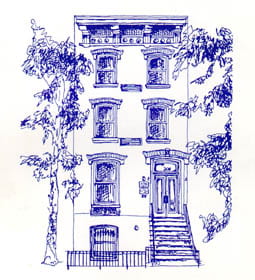 The Polish Institute of Arts & Sciences of America (PIASA) will be holding its 66th Annual Meeting – A Multi-Disciplinary Conference on Polish and Polish American Studies – on June 13-14, 2008 at the Holiday Inn Historic District Philadelphia.
The Polish Institute of Arts & Sciences of America (PIASA) will be holding its 66th Annual Meeting – A Multi-Disciplinary Conference on Polish and Polish American Studies – on June 13-14, 2008 at the Holiday Inn Historic District Philadelphia.
Call for proposals – Proposals for individual papers with short abstracts will be considered, but preference will be given to proposals for complete two hour sessions involving presentation of three 25 minute papers with a chair and a discussant. Proposals for panel and roundtable discussions should be submitted only on topics that lend themselves to that format. Initial screening of all proposals will be made as soon as they are received and forwarded to appropriate members of the program committee. Papers presented will be submitted for possible publication in The Polish Review. A short abstract should accompany each proposal. Proposal deadline: March 31, 2008, either sent to: PIASA, 208 E. 30th St., New York, NY 10016 or preferably submitted by email with a Word attachment to: tgromada@mindspring.com or Fax: (336) 940-2208. (See more details here: www.piasa.org/CALLFORPROPOSALS2008.pdf).
Augustyn & Grella-Mozejko
The final presentation of the Edmonton Composers’ Concert Society’s 2007-2008 season will feature the music of Polish composer Rafał Augustyn and Polish-Canadian composer Piotr Grella-Mozejko. The event will take place on Friday, 15 February at 8:00 p.m., in Studio 27 at the University of Alberta Fine Arts Building. The evening’s soloist is Chenoa Anderson, a leader among the world’s flautists who specialize in the newest repertoire. She will also perform music by Canadian composers Darlene Chepil Reid, Ian Crutchley, Shane Krepakevich, and Italian composer Salvatore Sciarrino. This extraordinary production will present a fascinating spectrum of compositional approaches, both acoustic and electro-acoustic.
Chenoa Anderson: Flute & Electronics
Friday, 15 February at 8:00 p.m.
Studio 27, University of Alberta Fine Arts Building
Sinfonia Iuventus Auditions
The first official Polish youth orchestra, Sinfonia Iuventus, will start auditioning applicants on February 4, 2008. The auditions will take place in “Dziekanka” student housing in Warsaw until the 12th of February, and on the 14th the auditions will move to the Chopin Music Academy in Warsaw. The creation of this orchestra was initiated by Polish conductor Jerzy Semkow, who pointed out that many young musicians could not find a job after graduating Music Academies and were forced to change the occupation or leave the country in search of open positions.
Sinfonia Iuventus will consist of musicians under 30 years of age, and their contracts will be for no longer than 5 years. The orchestra will work with national and international conductors and will rehearse in one of the Grand Theater-National Opera’s rehearsal rooms. The orchestra will function under supervision by the Ministry of Culture and National Heritage.
Nigel Kennedy News
 Nigel Kennedy has finished recording another CD with the Polish Chamber Orchestra. This time he performed violin concertos by Beethoven and Mozart as well as arrangement of Horace Silver’s Creepin’ In. For the Beethoven concerto, Kennedy played the modified Fritz Kreisler cadenza, and for the Mozart and Silver the cadenzas were written by Kennedy himself. On the album Kennedy fills a double role as both soloist and conductor. The CD is scheduled for release in March on EMI Classics.
Nigel Kennedy has finished recording another CD with the Polish Chamber Orchestra. This time he performed violin concertos by Beethoven and Mozart as well as arrangement of Horace Silver’s Creepin’ In. For the Beethoven concerto, Kennedy played the modified Fritz Kreisler cadenza, and for the Mozart and Silver the cadenzas were written by Kennedy himself. On the album Kennedy fills a double role as both soloist and conductor. The CD is scheduled for release in March on EMI Classics.
After The Golden Age
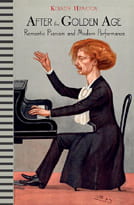 A new book celebrating the era of lyric pianism, entitled After the Golden Age: Romantic Pianism and Modern Performance, was released in November 2007. Author Kenneth Hamilton, himself a virtuoso pianist, wishes to remind both performers and audiences that the concert hall experience was not always as it is now, in this age of audience propriety and expectations for exactly what is written on the page. He analyzes the performance practices of the greats of the Golden Age, including Chopin, Paderewski, and Liszt. The following is the synopsis from the Oxford University Press website (www.oup.com):
A new book celebrating the era of lyric pianism, entitled After the Golden Age: Romantic Pianism and Modern Performance, was released in November 2007. Author Kenneth Hamilton, himself a virtuoso pianist, wishes to remind both performers and audiences that the concert hall experience was not always as it is now, in this age of audience propriety and expectations for exactly what is written on the page. He analyzes the performance practices of the greats of the Golden Age, including Chopin, Paderewski, and Liszt. The following is the synopsis from the Oxford University Press website (www.oup.com):
Kenneth Hamilton’s book engagingly and lucidly dissects the oft-invoked myth of a Great Tradition, or Golden Age of Pianism. It is written both for players and for members of their audiences by a pianist who believes that scholarship and readability can go hand-in-hand. Hamilton discusses in meticulous yet lively detail the performance-style of great pianists from Liszt to Paderewski, and delves into the far-from-inevitable development of the piano recital. He entertainingly recounts how classical concerts evolved from exuberant, sometimes riotous events into the formal, funereal trotting out of predictable pieces they can be today, how an often unhistorical “respect for the score” began to replace pianists’ improvisations and adaptations, and how the clinical custom arose that an audience should be seen and not heard.
Pianists will find food for thought here on their repertoire and the traditions of its performance. Hamilton chronicles why pianists of the past did not always begin a piece with the first note of the score, nor end with the last. He emphasizes that anxiety over wrong notes is a relatively recent psychosis, and playing entirely from memory a relatively recent requirement.
Audiences will encounter a vivid account of how drastically different are the recitals they attend compared to concerts of the past, and how their own role has diminished from noisily active participants in the concert experience to passive recipients of artistic benediction from the stage. They will discover when cowed listeners eventually stopped applauding between movements, and why they stopped talking loudly during them.
The book’s broad message proclaims that there is nothing divinely ordained about our own concert-practices, programming and piano-performance styles. Many aspects of the modern approach are unhistorical-some laudable, some merely ludicrous. They are also far removed from those fondly, if deceptively, remembered as constituting a Golden Age.
See reviews of this book in the Wall Street Journal and the New York Times.
Poles At The Grammys
The Naxos recording of Krzysztof Penderecki’s Symphony No. 7 ‘Seven Gates Of Jerusalem’ conducted by Antoni Wit with the National Philharmonic Symphony Orchestra and Choir has received a nomination for the Grammy award in the Best Choral Performance category. The album will compete with recordings by Simon Rattle, Ricardo Muti and Michale Gielen.
Another Polish accent at the Grammys is the nomination of Mehta’s recording of Verdi’s La Traviata which features Polish-born tenor, Piotr Beczala.
The awards ceremony will take place, in spite of the writer’s guild strike, on February 10th in Los Angeles. For more information about the nominees and Grammy awards go to the GRAMMY website.
Shop Of Songs Of Leon Schiller
The Polish Theatre Institute in the U.S. is presenting a program entitled “Shop of Songs of Leon Schiller” in New York City this month. Leon Schiller (March 1887, Kraków – March 1954, Warsaw) was one of the finest Polish theatre directors of his time and the founder of the Polish monumental theatre. The program features singers with piano accompaniment, presenting popular songs from the 14th century through the 1920’s. These events are open to the public. For more information or to purchase tickets, contact the Polish Theatre Institute at poltheatreinst@aol.com or Tel/Fax: (212) 724-9323.
Saturday, February 9 at 7:00 pm
Polish Consulate General
233 Madison Ave, NYC
Wednesday, February 20 at 7:00 pm
Kosciuszko Foundation
15 East 65 St., NYC (between 5th and Madison Ave.)
Awards
Krauze Honored By France
 Polish composer Zygmunt Krauze was awarded the highest state honor of the French Republic – Officier de la Legion d’Honneur [Officer of the Legion of Honor] – by the President of France. The award will be presented to Krauze at the French Embassy in Warsaw on February 4, 2008.
Polish composer Zygmunt Krauze was awarded the highest state honor of the French Republic – Officier de la Legion d’Honneur [Officer of the Legion of Honor] – by the President of France. The award will be presented to Krauze at the French Embassy in Warsaw on February 4, 2008.
Lutosławski Competition Results
 The first prize in Lutosławski Composition Competition was awarded ex-aequo to Maki Nakajima (Japan) for 34712 days after for two pianos and Carlo Alessandro Landini (Italy) for Le retour d’Astre for violin and piano. The second prize went to David Philip Hefti (Switzerland) for Ph(r)asen – string quartet #1. The jury for this year’s competitions was made up of: Yuki Morimoto, Bernard Rands, Vladimir Tarnopolski, Edward Pałłasz and Zygmunt Krauze.
The first prize in Lutosławski Composition Competition was awarded ex-aequo to Maki Nakajima (Japan) for 34712 days after for two pianos and Carlo Alessandro Landini (Italy) for Le retour d’Astre for violin and piano. The second prize went to David Philip Hefti (Switzerland) for Ph(r)asen – string quartet #1. The jury for this year’s competitions was made up of: Yuki Morimoto, Bernard Rands, Vladimir Tarnopolski, Edward Pałłasz and Zygmunt Krauze.
The competition was created in 1990 by Lutosławski himself. After his death, the Lutosławski Society in Warsaw assumed the organizational duties. The goal of the competition is to promote young composers from around the world and create an opportunity for those composers to write for similar ensembles to those for which Lutosławski wrote. This year the competition attracted 133 composition entries from around the world.
Multiple Honors For DUX
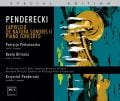 The music of composer Krzysztof Penderecki, in particular his Capriccio, De Natura Sonoris II, and Piano Concerto no. 1 “Resurrection,” are the subject of DUX recording 0582. Artists featured on the disc are Patrycja Piekutowska, violin, Beata Bilińska, piano, and the National Polish Radio Symphony Orchestra, Krzysztof Penderecki conducting.
The music of composer Krzysztof Penderecki, in particular his Capriccio, De Natura Sonoris II, and Piano Concerto no. 1 “Resurrection,” are the subject of DUX recording 0582. Artists featured on the disc are Patrycja Piekutowska, violin, Beata Bilińska, piano, and the National Polish Radio Symphony Orchestra, Krzysztof Penderecki conducting.
![]() This album has been very popular in recent months. At the end of 2007, it won the Joker Award from Crescendo Magazine in Belgium and Pizzicato Magazine‘s Supersonic Award. Following the annual MIDEM Forum, it has been announced that DUX 0582 – Penderecki: Capriccio, De Natura Sonoris II, Piano Concerto I – has won the 2008 MIDEM Classical Recording Award! As one of the world’s foremost music exhibitions, the judges of this competition are faced with an incredible list of nominees, so this award is a great honor for DUX records and the artist involved.
This album has been very popular in recent months. At the end of 2007, it won the Joker Award from Crescendo Magazine in Belgium and Pizzicato Magazine‘s Supersonic Award. Following the annual MIDEM Forum, it has been announced that DUX 0582 – Penderecki: Capriccio, De Natura Sonoris II, Piano Concerto I – has won the 2008 MIDEM Classical Recording Award! As one of the world’s foremost music exhibitions, the judges of this competition are faced with an incredible list of nominees, so this award is a great honor for DUX records and the artist involved.
Naxos In Pizzicato
Naxos records has been honored by Pizzicato Magazine. In the Excellentia category, Naxos CD 8.557747, featuring Sinfonia Varsovia, the American Horn Quartet, and Dariusz Wisniewski, conductor, took first place. Works on the album by: Handel, Haydn, Schumann, and Telemann
Borowicz Wins “Passport”
 Łukasz Borowicz, artistic director of the Polish Radio Orchestra in Warsaw, received the “Passport” Award from Polityka [Politics] magazine in the category of classical music. Borowicz received the award for “consequent building of conducting career, efforts to reestablish the Polish Radio Orchestra, and courage in repertoire choices.” Łukasz Borowicz won over Michał Dworzyński and Łukasz Kuropaczewski in his category. For the complete list of nominees and winners of this year’s “Passports” please visit Polityka’s website.
Łukasz Borowicz, artistic director of the Polish Radio Orchestra in Warsaw, received the “Passport” Award from Polityka [Politics] magazine in the category of classical music. Borowicz received the award for “consequent building of conducting career, efforts to reestablish the Polish Radio Orchestra, and courage in repertoire choices.” Łukasz Borowicz won over Michał Dworzyński and Łukasz Kuropaczewski in his category. For the complete list of nominees and winners of this year’s “Passports” please visit Polityka’s website.
Łukasz Borowicz is a graduate of the F. Chopin Music Academy in Warsaw. He is a laureate of multiple international conducting competitions. He served as an assistant to Ivan Fischer in the Budapest Festival Orchestra, Antoni Wit in the Polish National Philharmonic and Kazimierz Kord in the Polish National Opera. Since March 2007 he has been the conductor of the Polish Radio Orchestra in Warsaw.
Adam Aston (Adolf Lowensohn) & Polish-Jewish Music
By Gary Fitelberg
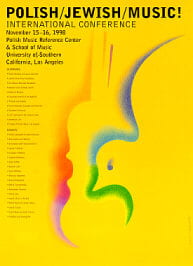 Polish-Jewish music was explored extensively during the Polish/Jewish/Music! conference sponsored by the Polish Music Center at USC on November 15-16, 1998. One forgotten performer and singer of the era explored at this conference is Adam Aston (born Adolf Lowensohn). Aston/Lowensohn, who was a Jew by origin, was born in Czerniowce, Poland.
Polish-Jewish music was explored extensively during the Polish/Jewish/Music! conference sponsored by the Polish Music Center at USC on November 15-16, 1998. One forgotten performer and singer of the era explored at this conference is Adam Aston (born Adolf Lowensohn). Aston/Lowensohn, who was a Jew by origin, was born in Czerniowce, Poland.
Adam Aston (Adolf Lowensohn) recorded a series of Jewish tangos, lullabies and romances, sung in a nostalgic, charming style, called the “typical East European Jewish” style. He was usually accompanied by the Syrena Rekord Dance Orchestra, led by the famous composer (and then musical director of “Syrena-Electro”) Henryk Wars, who was also of Jewish origin. The song “Nikodem” is one of the results of their collaboration. Besides this one, there are many other pre-war Polish-Jewish hits, which over the course of time and through many international performances became so popular worldwide that they are now considered “original Jewish folk songs.” “Miasteczko Belz” [My Shtetle Belz], “Rebeka,” “Srulek” and many others are examples of such hits.
Several performances by him may be heard on the website www.youtube.com, including “Nikodem,” “Zatanczmy, jeszcze ten raz” [Let’s dance once again], “Czerwone maki na Monte Cassino” [Red poppies at Monte Cassino], “Powstanie Warszawski” [Warsaw Uprising], “Miasteczko Belz” [My shtetele Belz]. Approximately 30 such songs are available for your enjoyment.
In pre-war Warsaw, Adam Aston (Adolf Loewensohn) made hundreds or perhaps thousands of recordings for various labels (Syrena-Electro, Odeon, Columbia) and sung in a few movies, including Manewry milosne [Love Maneuvers] (1935) and Dwie Joasie[The Two Joans] (clips of these are also available on www.youtube.com). During WWII he survived in a Russian occupation zone in South-East Poland, and would later join the Polish Emigré Army in the West. He never returned to Poland after the war, living in South Africa and in London, where he died in 1993. His outstanding voice – dim, strong and vibrating with nostalgia and passion – somewhat resembles certain passages in the performances of Joseph Schmidt, although Aston never sung anything but the popular “schlagers.”
Discography
DUX: Kilar & Nowowiejski
 Wojciech Kilar: Magnificat; Victoria.
Wojciech Kilar: Magnificat; Victoria.
Izabela Kłosińska – soprano; Tomasz Krzysica – tenor; Piotr Nowacki – bass; Orchestra and Choir of the Śląsk Philharmonic, Mirosław Jacek Błaszczyk cond.
DUX 0592
 FELIX NOWOWIEJSKI: Pieśni Morskie na chór Mieszany a capella op. 42 (nr 1-17)
FELIX NOWOWIEJSKI: Pieśni Morskie na chór Mieszany a capella op. 42 (nr 1-17)
Choir of the University Warmińsko-Mazurskiego, Benedykt Błoński cond.
DUX 0603
Ciuksza in P.R. Archives
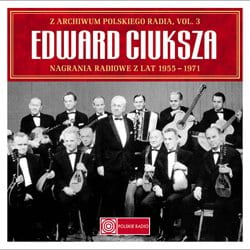 From the Polish Radio Archives vol. 3 – Edward Ciuksza
From the Polish Radio Archives vol. 3 – Edward Ciuksza
Łódź Mandolin Orchestra, Edward Ciuksza, leader
32 tracks of various “light” and popular music
PRCD1069-70
Edward Ciuksza was born in Ukraine and spent his youth in Wilno. He learned to play plucked string instruments and created a Mandolin Society “Kaskada” [Cascade]. Kaskada began to cooperate with a radio station in Wilno in 1928 and Ciuksza had a regular radio program “Wieczorynka.” The show was a mix of spoken word and music performed live by the ensemble. After WWII Ciuksza, his wife, and members of the orchestra relocated to Łódź, where he quickly started working for Polish Radio. The ensemble changed its name to Łódź Mandolin Orchestra and since 1950 was employed as a full-time radio ensemble. They worked for the Polish Radio until 1971, keeping audience interest with new repertoire and inclusion of new and interesting instruments such as accordion, celesta, xylophone, vibraphone, zither, Hawaian guitar, electric guitar, and electronium, a predecessor of the modern synthesizer.
This double CD is a selection of 36 of the pieces recorded by the orchestra during the tenure in Łódź, a mere fraction of the thousands of pieces recorded over the 21 years at Polish Radio.
Janowski’s Brahms
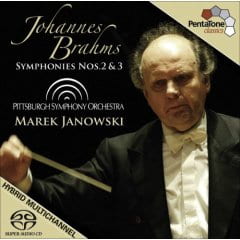 Brahms Symphonies no. 2 & 3
Brahms Symphonies no. 2 & 3
Johannes Brahms: Symphony No. 2 in D Major Op. 73; Symphony No. 3 in F Major Op. 90
Pittsburg Symphony Orchestra, Marek Janowski cond.
Naxos PTC5186 308
Marek Janowski is Polish-German conductor who has established his career primarily in Europe. He has conducted in Germany (Dusseldorf, Berlin, Dresden, Hamburg, Berlin), France (Paris – Orchestre Philharmonique de Radio France), and Monte Carlo. He has also conducted many American ensembles including Metropolitan Opera, Chicago Opera, San Francisco Opera and Boston Symphony Orchestra, among others. This latest release with Pittsburg Symphony Orchestra is a Super Audio CD (SA-CD) Hybrid, which allows it to play on Super Audio CD players as well as regular CD players. For more information about the conductor please visit AllMusicGuide. The CD is available for purchase on the Naxos Direct website.
Wawrowski Plays Paganini
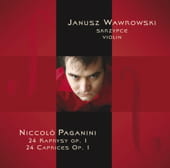 Niccolò Paganini – 24 Caprices op. 1
Niccolò Paganini – 24 Caprices op. 1
Janusz Wawrowski, violin
Accord CD142
It is a rare occasion to hear the complete 24 Caprices of Paganini’s at a concert or on a recording. This CD is first Polish edition of such scope, recorded by young and talented violinist, Janusz Wawrowski. According to Józef Kański’s review of the album in Ruch Muzyczny, “…Wawrowski’s outstanding technique and virtuosity in some of the caprices is mixed with musicianship of the highest magnitude and beauty of lyrical melodic narration in others…”
King Roger DVD
 King Roger
King Roger
Karol Szymanowski: King Roger (opera)
Wrocław Opera; Ewa Michnik, musical direction; Mariusz Treliński, director; Boris Kudlicka, set design; Wojciech Dziedzic, costume design; Emil Wesołowski, choreography
Polskie Wydawnictwo Audiowizualne
Chopin Recording
 Ingrid Fliter – Chopin
Ingrid Fliter – Chopin
Frederic Chopin: Mazurkas, Barcarolle, Impromptu
Ingrid Fliter, piano
EMI Classics 5099951489953
Performances
New Version Of Resurrection
 The Cincinnati Symphony Orchestra performed the world premiere of Penderecki’s revised Resurrection Piano Concerto on Friday, December 7. The composer himself led the orchestra in a program titled The Bold and the Beautiful, which also featured Penderecki’s Threnody for the Victims of Hiroshima.
The Cincinnati Symphony Orchestra performed the world premiere of Penderecki’s revised Resurrection Piano Concerto on Friday, December 7. The composer himself led the orchestra in a program titled The Bold and the Beautiful, which also featured Penderecki’s Threnody for the Victims of Hiroshima.
Penderecki admits that when he set about writing the concerto in the spring of 2001, he was afraid to tackle the genre because of the many famous concertos the 20th century had already produced, particularly those of Bartok and Prokoviev. Originally the work was conceptualized in the style of a capriccio but the events of September 11 deeply influenced what was to follow. Penderecki had this to say on the work:
The conception of the concerto changed completely, I wrote a darker, more serious work. The title Resurrection should be understood in a wider, symbolic and universal context. It stems from the chorale that crowns the work and is a symbol of life’s victory over death, of faith bringing consolation. I composed the chorale straight after the tragedy in New York. It was a purely human move, and at the same time a gesture of protest against cruelty.
Soloist Barry Douglas joined the CSO under the baton of Maestro Penderecki in two performances of the Resurrection Piano Concerto on Friday, December 7 and Saturday, December 8.
[Text from the Penderecki section of the Schott Music website: www.schott-music.com]
Fontana In Florida
The music of Julian Fontana has made its Jacksonville, Florida debut in the Friday Musicale auditorium (www.fridaymusicale.com) on Friday, January 18th. Two dances from Fontana’s La Havanne, opus 10 were included in a concert of Hispanic and Latin American Music performed by Ileana Fernandez, pianist for the Jacksonville Symphony Orchestra. Ms. Fernandez, a native of Cuba, skillfully performed the dances with authentic Cuban charm to the delight of the capacity audience. The music of Fontana was blended into a concert of well known composers, including Antonio Soler, Issac Albeniz, Ernesto Lecuona, Heitor Villa-Lobos and Alberto Ginastera.
[WR]
Read more about the composer and companion of Chopin, Julian Fontana, at www.julianfontana.com, including an article about the “The Internet Revival of Julian Fontana.”
Znaniecki In Bilbao
Polish National Opera director, Michał Znaniecki, premiered his version of Mozart’s opera Cosi fan tutte with the Bilbao Opera on the 19th of January. This staging is an adaptation of the staging prepared by him for the Wrocław Opera. His latest interpretation of Mozart’s work is considered to be one of the more creative in recent years, not only in Poland but throughout the opera world. As it is set in modern times, Znaniecki decided to research the habits and relationships of young people by frequently visiting night clubs and discos. By translating this to the stage, Znaniecki hopes to appeal to young audiences, encouraging them to identify with the stage action in the same way as they would to a Hollywood film. The libretto, by Lorenzo da Ponte, is about two young officers who decide to test the fidelity of their girlfriends.
The cast of the Bilbao Opera staging included stars such as Soile Isokoski (as Fiordiliga) and also Jacek Jaskuła from the Wrocław Opera (as Guglielmo).
Znaniecki is known in Poland for his creations with the Wrocław Opera. He also works with various opera theaters throughout Europe, mostly in Italy. In 2007 his staging of Cyrano de Bergerac for the Opera in Valencia, with Placido Domingo in the title role, received a very warm reception.
Grella-Mojeko In Film
On January 31st, Mile Zero Dance (MZD) and the Film and Video Arts Society of Alberta (FAVA) present an event of dance, film and music entitled “MZD FAVA LABA” in Zeidler Hall of the Citadel Theatre Complex in Edmonton, Alberta, Canada. Four short films were premiered, as a result of the collaborative engagement of two of Edmonton’s most experimental and cutting edge arts organizations, bringing dances for screen to Edmonton audiences. One of the four films, Night Shot (the creation of dancer and MZD Artistic Director Gerry Morita, and 16 mm horror filmmaker and existential photographer Jeremy Rittwage) used the music of Polish-Canadian composer Piotr Grella-Mozejko for their film. MZD’s innovative annual Dance Lab is a rigorous creative process that is designed to stimulate exploration, collaboration, and artistic research by giving artists the tools to truly experiment and receive audience feedback.
Anniversaries
Born This Month
- 2 February 1909 – Grazyna BACEWICZ , composer, violinist, pianist (d. 1969)
- 7 February 1877 – Feliks NOWOWIEJSKI, composer, organist
- 8 February 1953 – Mieszko GÓRSKI, composer, teacher (active in Gdansk and Koszalin)
- 9 February 1954 – Marian GORDIEJUK, composer, teacher, theorist (active in Bydgoszcz)
- 14 February 1882 – Ignacy FRIEDMAN, pianist and composer (d. 1948)
- 18 February 1881 – Zygmunt MOSSOCZY, opera singer (bass), chemist (d. 1962)
- 27 February 1898 – Bronislaw RUTKOWSKI, organist, music critic, conductor and composer (d. 1964)
- 28 February 1910 – Roman MACIEJEWSKI , composer, pianist (d. 1998 in Sweden)
- 28 February 1953 – Marcin BLAZEWICZ, composer, teacher (active in Warsaw)
Died This Month
- 3 February 1959 – Stanislaw GRUSZCZYNSKI, tenor (active throughout Europe, b. 1891)
- 3 February 1929 – Antoni Wawrzyniec GRUDZINSKI, pianist, teacher, and music critic (active in Lódz and Warsaw, b. 1875)
- 7 February 1954 – Jan Adam MAKLAKIEWICZ, composer (active in Warsaw, b. 1899)
- 7 February 1994 – Witold LUTOSLAWSKI , composer and conductor (b. 1913)
- 8 February 1909 – Mieczyslaw KARLOWICZ , composer, conductor, writer (b. 1876)
- 9 February 1959 – Ignacy NEUMARK, composer and conductor (active in Copenhagen, Oslo and Schveningen, b. 1888)
- 10 February 1905 – Ignacy KRZYZANOWSKI, pianist and composer (active in Kraków and Warsaw, b. 1826)
- 14 February 1957 – Wawrzyniec Jerzy ZULAWSKI, composer, music critic, teacher, and mountain climber (b. 1916)
- 23 February 1957 – Stefan SLAZAK, singer, organist, conductor (active in Silesia, b. 1889)
- 27 February 1831 – Józef KOZLOWSKI, composer (active at the Russian Court in Petersburg, b. 1757)
- 29 February 2004 – Witold RUDZINSKI, composer, music critic and teacher


